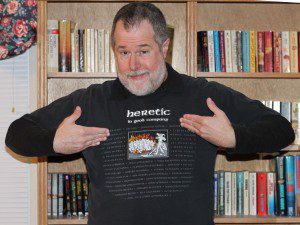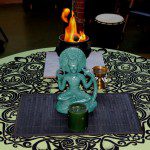The intra-Pagan fighting between polytheists and humanists / atheists seems to be picking up again. There have been numerous blog posts and social media comments – I saw one Facebook argument continue for almost 300 entries.
I have neither the time nor the desire to curate the conflict. There have been critiques of some insulting, overreaching diatribes by atheists. Not all of the critiques are from polytheists or even Pagans, and I’ve done that myself. There have been Atheopagans who’ve been highly critical of what they see as unreason, and while the ones I read did not completely dismiss the value of religious experience, they insist there is only one proper explanation for it. Not surprisingly, there have been polytheist responses attacking the presumed supremacy of non-theism and insisting that rights of polytheists be respected.
These arguments are unfortunate even if they are perhaps inevitable. While they help various Pagan subgroups more precisely define and differentiate themselves, they do so in a way that breeds bad feelings and discourages cooperation on common interests. So long as religious extremists are committing genocide, fundamentalists are oppressing women and LGBT people, militarized police are killing people of color, and corporations are raping the Earth, Pagans have absolutely no business fighting each other inside our own tent.
Over on the Nature’s Path blog, Maggie Beaumont has a nice piece on why she’s UU and Pagan. One of my first posts after moving to Patheos two years ago explained why “I am fully engaged as a Pagan, as a Druid, and as a Unitarian Universalist.” While Unitarian Universalism is far from perfect and you will still come across theist / non-theist arguments from time to time, my experience as a UU has taught me a lot about how to live, work, and thrive in a religiously diverse community.
 I have a t-shirt that says “Heretic in Good Company.” I got it at the 2005 UUA General Assembly and I’ve seen other UUs wearing it and similar shirts. “Heresy” has its roots in a Greek word meaning “to choose” and it has long been used to describe those who made unorthodox religious choices, often with unpleasant results. Even though it is generally safer to be a heretic today than in the past, claiming that identity carries certain obligations: you can’t flaunt your non-conformity while simultaneously demanding conformity from others.
I have a t-shirt that says “Heretic in Good Company.” I got it at the 2005 UUA General Assembly and I’ve seen other UUs wearing it and similar shirts. “Heresy” has its roots in a Greek word meaning “to choose” and it has long been used to describe those who made unorthodox religious choices, often with unpleasant results. Even though it is generally safer to be a heretic today than in the past, claiming that identity carries certain obligations: you can’t flaunt your non-conformity while simultaneously demanding conformity from others.
Well, I suppose you can, but it makes you look like a hypocritical fool.
When I walk into a Sunday service I’m walking into another Big Tent. There are Pagans, Christians, Buddhists, atheists, and a lot of people who are hard to classify and damned proud of it. We believe different things about the nature of the universe, whether there are Gods and if so what They’re like, whether humans and other animals have souls and if so whether they survive death, and if so in what form.
We don’t gloss over our differences (most of us don’t, anyway). But we don’t feel a need to convert each other, and more importantly, we see no reason for those differences on unprovable matters to interfere with our common interests in building a more just and more compassionate world here and now.
I’ll be leading the Sunday service and speaking – preaching – at Denton UU two weeks from today. I’m a polytheist, a Pagan, and a Druid – these paths and my commitment to them are part of who and what I am and what I say cannot help but be informed by them. But I’m perfectly capable of speaking to our common interests as UUs and I’m perfectly happy to do so.
Last night’s CUUPS Imbolc ritual (which Cynthia coordinated) honored Brighid and Lugh. We poured offerings to the ancestors and the spirits of the land. It was unambiguously a polytheistic ceremony, but there was no recitation of some creed of polytheism. I know for sure at least a couple of the people there see all Gods as aspects of one God, and I’m fairly confident some haven’t given it much thought.
It doesn’t matter. They honored Brighid and Lugh, they honored the ancestors, and they honored the spirits of the land. What they think about Them isn’t important.
What’s important is how their beliefs inspire them to act. What’s important is how their practices help them learn and grow. What’s important is how their relationships with the Gods, ancestors, and spirits – however they conceive of them – help them become more God-like themselves.
For those of us who are called by the Gods, theology is important. If I’m going to honor the Gods I want to honor Them for who and what They really are. That can’t be found in some inerrant, infallible book – as though there was such a thing. They are clouded in majesty and mystery. They reveal Themselves in glimpses and impressions… and occasionally in direct communion that overloads our human capacity for comprehension. Learning about Them requires experiencing Them first hand, thinking about those experiences, comparing them to the experiences of others (including our ancient ancestors), and figuring out what conclusions we can reasonably draw from all our information.
The conclusions a polytheist draws will be different from the conclusions an atheist draws, and that’s OK. We have different foundational assumptions about the way the universe works. If we start from different places, it’s no surprise we end up in different places. While debating the merits of our foundations and conclusions can be educational and occasionally enlightening, there is simply no need to fight over them.
And our differing assumptions and conclusions are never justification for attacking someone as delusional, backward, ignorant, or any other form of othering.
So I encourage our most ardent atheists and our most pious polytheists to talk about what they do, what they believe, and why. I encourage them to explain their assumptions, their experiences, and their interpretations. But I encourage them to do so in ways that are honest and respectful and perhaps even friendly.
It’s a good idea this polytheist learned from the Unitarian Universalists.















